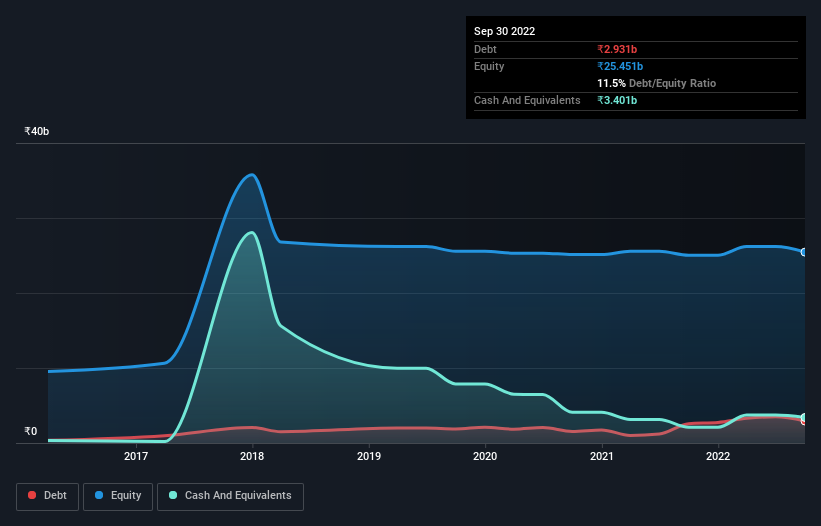Is Unichem Laboratories (NSE:UNICHEMLAB) Using Debt Sensibly?
Warren Buffett famously said, 'Volatility is far from synonymous with risk.' So it seems the smart money knows that debt - which is usually involved in bankruptcies - is a very important factor, when you assess how risky a company is. Importantly, Unichem Laboratories Limited (NSE:UNICHEMLAB) does carry debt. But the real question is whether this debt is making the company risky.
Why Does Debt Bring Risk?
Debt assists a business until the business has trouble paying it off, either with new capital or with free cash flow. In the worst case scenario, a company can go bankrupt if it cannot pay its creditors. However, a more common (but still painful) scenario is that it has to raise new equity capital at a low price, thus permanently diluting shareholders. Of course, plenty of companies use debt to fund growth, without any negative consequences. The first step when considering a company's debt levels is to consider its cash and debt together.
Check out our latest analysis for Unichem Laboratories
What Is Unichem Laboratories's Debt?
As you can see below, at the end of September 2022, Unichem Laboratories had ₹2.93b of debt, up from ₹2.58b a year ago. Click the image for more detail. However, its balance sheet shows it holds ₹3.40b in cash, so it actually has ₹470.6m net cash.

A Look At Unichem Laboratories' Liabilities
The latest balance sheet data shows that Unichem Laboratories had liabilities of ₹4.87b due within a year, and liabilities of ₹1.32b falling due after that. Offsetting this, it had ₹3.40b in cash and ₹4.34b in receivables that were due within 12 months. So it actually has ₹1.56b more liquid assets than total liabilities.
This surplus suggests that Unichem Laboratories has a conservative balance sheet, and could probably eliminate its debt without much difficulty. Succinctly put, Unichem Laboratories boasts net cash, so it's fair to say it does not have a heavy debt load! The balance sheet is clearly the area to focus on when you are analysing debt. But you can't view debt in total isolation; since Unichem Laboratories will need earnings to service that debt. So when considering debt, it's definitely worth looking at the earnings trend. Click here for an interactive snapshot.
Over 12 months, Unichem Laboratories reported revenue of ₹13b, which is a gain of 11%, although it did not report any earnings before interest and tax. That rate of growth is a bit slow for our taste, but it takes all types to make a world.
So How Risky Is Unichem Laboratories?
We have no doubt that loss making companies are, in general, riskier than profitable ones. And in the last year Unichem Laboratories had an earnings before interest and tax (EBIT) loss, truth be told. And over the same period it saw negative free cash outflow of ₹1.1b and booked a ₹367m accounting loss. But at least it has ₹470.6m on the balance sheet to spend on growth, near-term. Overall, its balance sheet doesn't seem overly risky, at the moment, but we're always cautious until we see the positive free cash flow. The balance sheet is clearly the area to focus on when you are analysing debt. However, not all investment risk resides within the balance sheet - far from it. Be aware that Unichem Laboratories is showing 2 warning signs in our investment analysis , and 1 of those makes us a bit uncomfortable...
If you're interested in investing in businesses that can grow profits without the burden of debt, then check out this free list of growing businesses that have net cash on the balance sheet.
New: AI Stock Screener & Alerts
Our new AI Stock Screener scans the market every day to uncover opportunities.
• Dividend Powerhouses (3%+ Yield)
• Undervalued Small Caps with Insider Buying
• High growth Tech and AI Companies
Or build your own from over 50 metrics.
Have feedback on this article? Concerned about the content? Get in touch with us directly. Alternatively, email editorial-team (at) simplywallst.com.
This article by Simply Wall St is general in nature. We provide commentary based on historical data and analyst forecasts only using an unbiased methodology and our articles are not intended to be financial advice. It does not constitute a recommendation to buy or sell any stock, and does not take account of your objectives, or your financial situation. We aim to bring you long-term focused analysis driven by fundamental data. Note that our analysis may not factor in the latest price-sensitive company announcements or qualitative material. Simply Wall St has no position in any stocks mentioned.
About NSEI:UNICHEMLAB
Unichem Laboratories
A pharmaceutical company, manufactures and sells pharmaceutical products in India, the United States, and internationally.
Adequate balance sheet with questionable track record.
Similar Companies
Market Insights
Community Narratives



